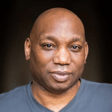
Episode 492: The Host Becomes the Hosted — Brendan O'Meara in conversation with Daniel Littlewood
"My editor was like, hold on, you need to put your thumb on the scale of why this matters. Now, there's no first person in this, but you have your thumb on the scale, you need to assert your own point of view. Like, this matters, why? says Brendan O'Meara, author of The Front Runner: The Life of Steve Prefontaine Mariner Books.
Who the heck does this host think he is being a guest on his own podcast? The nerve of this guy. That’s right, for the third live taping of the Creative Nonfiction Podcast at Gratitude Brewing, I was interviewed by the brilliant Daniel Littlewood, who kinda makes me look and sound like a jabroni’s jabroni.
Daniel is Group Creative Director at The Explainer Studio at Vox Media, Inc. He edited the documentary feature film “Don’t Think I’ve Forgotten: Cambodia’s Lost Rock & Roll.” Formerly, he was the lead producer for HuffPost’s Live’s multi-million dollar sponsored content division. He has a tremendously easy-going, conversation nature to interviewing with tremendous shot-clock awareness that required next to no editing on my part.
So The Front Runner has, at this point, been out for four months. Daniel and I recorded this on July 27 so the book was only out for two months at that time. This was a painful edit for me because I’m so sick of hearing myself talk and talk and talk. I’m not so sure I took a single breath during this conversation, but Daniel was an incredible partner and if something should happen to me, I want Daniel to take over CNF Pod.
In this episode, I talk about:
- My love of my editor
- Valorization of pain
- Making the case for why I was the person to write this book
- Asserting POV in biography
- World building
- And why it was a good thing I forgot the combination of our gun safe
Ruby McConnell introduces us at Gratitude Brewing.
Newsletter: Rage Against the Algorithm
Show notes: brendanomeara.com



















